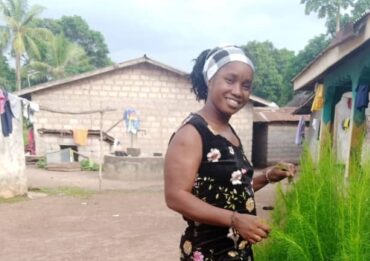Adamsay expresses her love for This Is Lebanon
After nearly three years of work without papers, pay, or protection, Adamsay Kamara was abandoned in Daoura. With the help of This Is Lebanon, she finally returned home and received the salary she thought she’d never see.
Worker
Adamsay Kamara
THE VIDEO
Watch Adamsay express her love
In October 2024, during Israel’s war on Lebanon, Adamsay Kamara, Sierra Leonean, was dropped in Daoura instead of at the airport after working for her employer for two years, 7 months.
Adamsay was given shelter by other African women and one week later, contacted This Is Lebanon for help. Her case was complicated by the fact that her employer had never done her work permit or residency permit, keeping her undocumented throughout the whole period of her employment. Secondly, her passport had been lost by her agent, Bilal Raya of Soft Power Agency - known to us for abuse in multiple cases. When Adamsay texted her employer requesting her unpaid salary and her ticket home, he responded dismissively, alleging she had stolen money, a common tactic to justify unfair dismissals and non-payment.
This Is Lebanon was able to assist Adamsay to obtain the paperwork and permission needed to leave Lebanon. We paid for her ticket with money donated by supporters and, once she was safely home, successfully negotiated for her unpaid salary. She was delighted, having given up all hope of ever receiving her money.
Adamsay Kamara’s story underscores the extreme hardships faced by migrant domestic workers, including false accusations, lack of legal protection, and the difficulties in navigating immigration and legal processes. Her case highlights the indignities suffered, even making safe repatriation a challenge.
Her employer, who has over 5,000 Facebook followers, has not been named in this article since he did, eventually, pay her the salary she was owed.
-----------------------
Adamsay has reviewed this article and confirmed that the information presented is accurate and she has consented to the sharing of her story.
This Is Lebanon was established in 2017 with the aim of working towards abolishing the kafala system in Lebanon. Our goal has been to raise awareness about the dangers of the kafala system by exposing the horrific conditions under which migrant domestic workers live and the perpetrators of abuse as well as advocating with and on behalf of migrant domestic workers. Ultimately, This Is Lebanon gives a voice to workers and encourages witnesses of abuse to come forward.
Kafala (the Arabic word for sponsorship) refers to the set of regulations and administrative practices used to sponsor and employ migrant workers in Lebanon, mostly women from African and Asian countries working for private households. Domestic workers are excluded from Lebanese labor law and lack basic protections. The kafala system protects abusers and denies domestic workers of basic human rights. The high degree of control over workers’ rights provided by the kafala system has led to cases of modern slavery, human trafficking, and exploitation.
القصة
في تشرين الأول ٢٠٢٤ وخلال حرب إسرائيل على لبنان، تُركت أدامسي كامارا، وهي مواطنة من سيراليون، في منطقة الدوّار بدلاً من مطار بيروت بعد أن عملت لدى صاحب عملها مدة سنتين وسبعة أشهر.
حصلت أدامسي على مأوى من نساء إفريقيات أخريات، وبعد أسبوع تواصلت مع منظمة "ّهذا لبنان" طلباً للمساعدة. تعقّدت قضيتها بسبب عدم قيام صاحب عملها بالحصول على إجازة عمل أو إقامة لها طوال فترة عملها، ما أبقاها في وضع غير نظامي. كما أن جواز سفرها كان قد فُقد لدى وكيلها، بلال ريا من وكالة "سوفت باور"، المعروف لدينا بتورطه في عدة قضايا إساءة. وعندما أرسلت أدامسي رسالة لصاحب عملها تطلب فيها راتبها غير المدفوع وتذكرة سفرها إلى وطنها، ردّ عليها باستخفاف واتهمها زوراً بالسرقة، في محاولة شائعة لتبرير الطرد التعسفي وحرمان العاملات من حقوقهن.
تمكنت منظمة "هذا لبنان" من مساعدة أدامسي في الحصول على المستندات والتصاريح اللازمة لمغادرة لبنان. كما دفعت المنظمة ثمن تذكرتها بفضل التبرعات المقدمة من داعمين، وبعد وصولها إلى وطنها بسلام، نجحت في التفاوض لتحصيل راتبها المتأخر. كانت فرحتها كبيرة، إذ كانت قد فقدت الأمل تماماً في الحصول أموالها.
تُبرز قصة أدامسي كامارا الصعوبات القاسية التي تواجه العاملات المهاجرات في الخدمة المنزلية، من اتهامات باطلة وغياب الحماية القانونية إلى تعقيدات الهجرة والإجراءات الرسمية. وتؤكد قضيتها حجم الانتهاكات التي يتعرضن لها، حتى إن إعادة الترحيل الآمن تصبح تحدياً بحد ذاته.
أما صاحب عملها، الذي يتابعه أكثر من ٥٠٠٠ شخص على فيسبوك، فلم يُذكر اسمه في هذا المقال نظراً لأنه قام في النهاية بدفع راتبها المستحق.
—-------------
اطلعت العاملة على هذا المقال وأكّدت صحة المعلومات الواردة فيه، وطلبت نشر قصتها.
تأسست منظمة "هذا لبنان" عام ٢٠١٧ بهدف العمل على إلغاء نظام الكفالة في لبنان. وتسعى المنظمة إلى تسليط الضوء على مخاطر هذا النظام من خلال فضح الظروف المروعة التي تعيشها العاملات المنزليات المهاجرات، وكشف هوية المعتدين، إضافةً إلى مناصرة حقوق العاملات والدفاع عنهن. وفي نهاية المطاف، تعمل المنظمة على إيصال صوت العاملات وتشجيع الشهود على التبليغ عن الانتهاكات.
نظام الكفالة هو مجموعة من القوانين والممارسات الإدارية التي تُستخدم لرعاية وتشغيل العمال المهاجرين في لبنان، وغالبًا ما تكون النساء من دول إفريقية وآسيوية يعملن في المنازل. تُستثنى العاملات المنزليات من قانون العمل اللبناني، وبالتالي يفتقرن إلى الحماية القانونية الأساسية. يوفر نظام الكفالة غطاءً قانونياً للمعتدين ويحرم العاملات من أبسط حقوق الإنسان. وقد أدى التحكم الكبير الذي يمنحه النظام لصاحب العمل إلى انتشار حالات من العبودية الحديثة والاتجار بالبشر والاستغلال.

